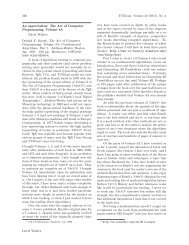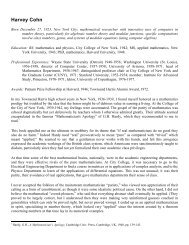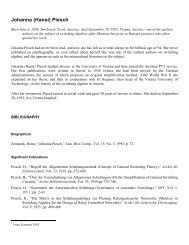L - Walden-family.com
L - Walden-family.com
L - Walden-family.com
Create successful ePaper yourself
Turn your PDF publications into a flip-book with our unique Google optimized e-Paper software.
l<br />
Timeout. The timeout routine is started every 25.6 ms<br />
(called a fast-tick timeout period) by a clock interrupt. The<br />
routine has two sections: the fast timeout routine which<br />
"wakes up 11 any Host or modem interrupt routine that has languished<br />
(for example, when the Host input routine could not immed!ately<br />
start a new input because of a shortage in buffer space); and<br />
the slow timeout routine which marks lines as alive or dead,<br />
updates the routing tables and does long term garbage collection<br />
of queues and other data structures. (For example, it protects<br />
the system from the c:11mulati ve effect of sueh fA.i lures as a<br />
lost packet of a multiple packet message, where buffers are tied<br />
up in message reassembly).<br />
These two routines, Fast and Slow, are executed so that<br />
fast timeout runs every clock tick (25.6 ms) and the slow timeout<br />
runs every 25th clock tick (640 ms). Although they run off<br />
a <strong>com</strong>mon interrupt, they are constructed to allow fast timeout<br />
to interrupt slow timeout should slow timeout not <strong>com</strong>plete<br />
execution before the next timeout period. During garbage collection,<br />
every table, most queues, and many states of the program are<br />
t irned out. rrhus, if an entry remains in a table abnormally long<br />
or if a routine remains in a particular state for abnormally<br />
long, this entry or state is garbage-collected and the table<br />
or routine is returned to its initial or nominal state. In<br />
this way, abnormal conditions are not allowed to hang up the<br />
system indefinitely.<br />
]<br />
J<br />
J<br />
]<br />
1<br />
J<br />
3- l 4 8/73<br />
.. J

















